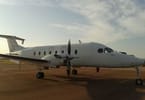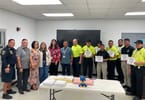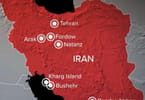In an effort to compile statistics that might fire up officials in Washington, Crew Unlimited surveyed its clients on several aspects of U.S. customs and immigration.
Of the 402 foreign captains and captains on foreign-registered vessels who responded to the survey, 42.5 percent said they received consistent procedures from U.S. customs and immigration officials.
An almost equal number – 41.5 percent – reported their experiences as inconsistent.
“That’s ridiculous,” said Ami Ira, owner of Crew Unlimited, a crew placement agency in Ft. Lauderdale. “That should be 90 percent consistent. That’s the biggest problem we have in the industry.
“The ultimate goal is to get the Department of State to put marine guidelines on letterhead and distribute them to all the individual customs offices,” she said.
The U.S. Superyacht Association is organizing a captains briefing during the Ft. Lauderdale International Boat Show and has invited high-ranking officials from the U.S. Department of Homeland Security, including customs and immigration officials, as well as from the Department of State, which issues visas in embassies around the world.
“If we can get them to say this visa is appropriate for yacht crew, and here’s what you need to get it, we’ll go a long way in resolving one of the biggest issues crew face when coming to the United States,” said John Mann, chairman of the USSA’s advocacy committee and owner of Bluewater Books and Charts in Ft. Lauderdale.
While 50 percent of the captains who responded to the Crew Unlimited survey said they did not have any difficulties obtaining a B1/B2 visa for entry, 32.8 percent said they had.
Twenty-three percent of respondents said they have opted not to come to the United States rather than deal with inconsistent requirements. And 19 percent said they have skipped Florida for repairs, opting instead to head directly to the Mediterranean from the Caribbean.
“That’s huge,” Ira said. “I couldn’t afford a 23 percent drop in my business. How can the service yards here in town? This must be killing them.”
The survey asked captains how much their yachts spend on average every month when in port, excluding crew salaries but including dockage, fuel, provisions, maintenance, etc.
The largest group – 25.8 percent – spent more than $60,000 a month; 11.6 percent spent between $40,000 and $60,000; 20.6 percent spent between $20,000 and $40,000; and 10 percent spent between $10,000 and $20,000. Just 1.4 percent spent less than $10,000 a month.
The final question in the 10-question survey asked these captains what changes they would suggest for alleviating some of the problems they face. Nearly all of the more than 232 captains who offered ideas suggested consistent rules and enforcement.
Here are some other comments:
“That they come to the boat. It seems pretty useless for security if we enter and then, unaccompanied, go to CBP.”
“New crew visas just for yachties. A clear understanding of the rules by all customs/immigration officials. More professionalism from the officers.”
“A blanket policy where all U.S. customs offices do and require the same thing.”
“Reporting in to immigration via a cab after the boat is at the dock does absolutely nothing to increase security. If you want to make it truly safe then customs and immigration need to be at a dock in every major inlet and require the boats coming from outside the United States to report to this dock prior to proceeding on to a marina. Otherwise, it is just an illusion of security, and not a very good illusion at that.”
“A clear and concise booklet that spells everything out for visiting yachts.”
“A well established set of guidelines and rules [that are] well published and having the immigration officers educated.”
“A special visa for full-time yacht crew that would last five to 10 years that would allow the crew to stay in the United States for up to one year.”
“Written confirmation that yacht crew operate under B1/B2 visas.”
“Consistent staffing and faster response to the phone lines for the initial call in.”
“An understanding of the financial benefits [of yachting] for Ft. Lauderdale. Fair treatment for those not breaking the rules of the B1-B2 visa and using it properly. Penalties for those who misuse it.”
“It would be nice if they just gave you six months every time.”
“Rules change constantly. We keep abreast of them, and then we enter an office that does not have a clue as to what is happening at times.”
“Consistent expectations at all entry points and educated custom inspectors to their own rules and regulations.”
“That all embassies understand that yachtsmen require B1/B2 instead of having an argument with the consulate in Malta about it. And more consistency. I need a visa to go from BVI to USVI by yacht but not by ferry. Why?
“An office set up the specifically caters to megayachts and their crews.”
“Obviously, more employees.”
“Link communications between Coast Guard and customs/immigration. Also, start a database of professional yacht crew that come and go from the United States so the people in the industry that are professionals do not have the trouble entering.”
“It’s important for yacht professionals to have our own U.S. visa category that clearly defines our purpose in the United States.”
“Continued dialogue with U.S. authorities so that a greater understanding of the industry is ascertained in order to mutually benefit all parties.”
“The United States needs to classify yachts for what they are, and treat them under conditions that are warranted. We are not cargo ships, cruise ships or military. Most of the systems in place for those interests are not effective with us. Our interests and capabilities increase security in the areas we travel, and the United States should recognize the additional asset this offers them.”
“One agency to deal with; one policy throughout the United States.”
“A hotline phone number to answer questions for both the vessel and the agents for quick clarification on any situations that might come up”
“Better training and a higher awareness of what yacht crews do and the financial impact yachts have on the local community.”
“Exactly what you are trying to do: some sort of standard. Whatever it is, as long as we know in advance instead of pulling into a port and being fined for something we didn’t know about.”
“Stop treating everyone as a criminal.”
“Remember that they are public servants, not kings and jailers.”
“Internet-based checking in/out so we don’t have to sit on the phone for so long (normally on hold).”
“A more consistent, polite approach in all aspects and a smoothing out of procedures and paperwork. Ensuring that all shoreside officials are aware of the correct procedures and follow them in a courteous manner.”
“It would nice if we didn’t have to do a Notice of Arrival on domestic trips as it makes it difficult for the owners to be spontaneous. It would also be nice if we didn’t have to call customs every time we move ports within the United States.”
“Any improvement would be appreciated.”
“Ability to clear in at known marinas, which is the process in most of Europe.”
“24-hour check in.”
“Better understanding of who we are and what we do.”
“A campaign to educate the agents within the various zones or offices as to the correct visa requirements for yacht crew.”
“A customs dock in Lake Worth Inlet, Port Everglades, Port of Miami and Key West would be an improvement over the van ride to customs and immigration.”
“More respect and politeness. Consistent policy and acceptance of the fact that foreign flagged vessels may employ their own nationalities of crew. Also, U.S.-flagged vessels should allow other nationalities to work on their vessels; red ensign vessels do.”
“Special visa for yacht crew and thorough education for all officers on how to handle yacht crew. I am not asking for special or privileged treatment, simply an understanding that yacht crew are different than cruise ship crew, for instance.”
“Immigration officials who understand the system and are pleasant and accommodating. We don’t want to break the rules; we just want to visit and spend money.”
“Great that the clearance forms and crew list forms are available online. It would be great if the I-94 was available as well.”
“The biggest change we would like to see is education of the embassy staff and immigration officials at airports. They need to know which visa applies when, without us having to explain, cajole, beg or call a supervisor over.”
“The old system where the crew and passengers are not allowed off the boat. Then we can control any bad guys from entering United States. Getting off the boat to go to a remote office is plain dumb.”
“Not having to sit on hold with customs for a total of 11 hours. This actually happened to me not long ago. An actual place to check in the vessel with CBP agents aboard the vessel.”
“Customs/immigration procedures are different from port to port to port. It should be standardized nationwide.”
“Have a dock placed in the Port, staffed 24/7. How secure can it be when a vessel can travel 5-6 miles inland and report by phone and or 24 hours later? All formalities seem to be for show only. Train personnel, and eliminate the rudeness and arrogance.”
“The ability for port officers to extend the visit when the date is close to running out would be the most helpful action.”
“Skip the requirement of visas for permanently employed professional crew, if they have a seamans book for example, and let crew in on the visa waiver program, if the crew comes from a country that has a visa waiver agreement with the U.S. government
“See us as professionals that bring a lot of revenue to the country and not as criminals that want to live there.”
“Maybe a system whereby once a vessel and crew are in the database, only the captain is required to go to the custom offices to clear in. If there has been a change of crew in foreign waters then only the new crew member needs to accompany the captain to clear in.”
“Make a customs/immigration office just for yachts in Ft Lauderdale. I’m sure the yachting community could pay a couple of extra salaries.”
“As we have in Australia, a yacht crew visa that allows extended stays, flights in and out of the country, the ability to tour the country on time off, etc. It’s like a visitor’s visa that allows more leeway in time due to being in the yachting industry. Australia wants yachts to stay as long as possible without hassle, as they spend a lot of money. The easier the government makes this, the more and longer the yachts will stay.”
WHAT TO TAKE AWAY FROM THIS ARTICLE:
- If you want to make it truly safe then customs and immigration need to be at a dock in every major inlet and require the boats coming from outside the United States to report to this dock prior to proceeding on to a marina.
- “If we can get them to say this visa is appropriate for yacht crew, and here's what you need to get it, we'll go a long way in resolving one of the biggest issues crew face when coming to the United States,”.
- “Reporting in to immigration via a cab after the boat is at the dock does absolutely nothing to increase security.






















